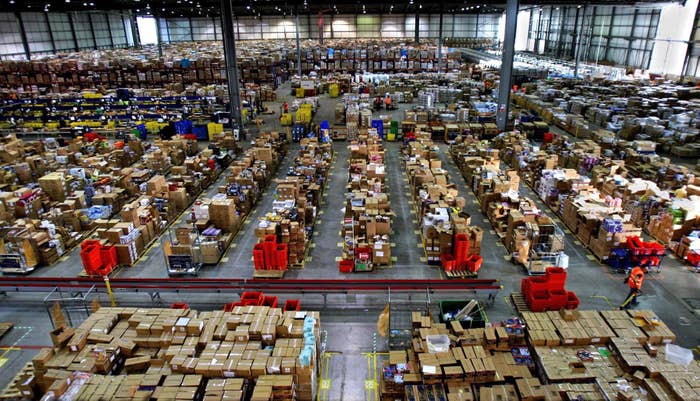In the best of times, the work I did at the Amazon warehouse left me aching and numb. Now, going to work is just terrifying.
Rina CummingsBuzzFeed Contributor Posted on May 5, 2020

Chris Radburn / PA Wire/PA Photo An Amazon warehouse in the UK
Even before the coronavirus hit, going to work at an Amazon warehouse already felt like I was risking my health. Standing on your feet for 12 hours at a time and performing repetitive motions while sorting boxes takes a toll on your body. By the middle of my shift, my joints throb with pain and sometimes my fingers become numb. I know my body is asking me to take a breather. But the clock doesn’t stop ticking, and I can’t make rate if I take a break.
In the first few weeks after COVID-19 came to New York City, the warehouse operated as usual. People started getting sick, and we knew it, but Amazon wasn’t giving us any information. The company said it sent people who were confirmed to have had contact with the virus home with pay, but most people who were sick weren’t able to get tested. And we know many people who were sent home still haven’t received pay. We kept working, standing next to each other on the floor of the sorting department, in the break room, and on the crowded buses taking us to the warehouse.
I have been out on medical leave for a few weeks, choosing not to go into work to protect myself and my family. Amazon let us have unlimited unpaid time off (UPT) last month, but that’s not an option anymore. We either have to go to work or quit, which would risk eligibility for unemployment.
I worry about catching the coronavirus when I go back to work. The company has now staggered our shifts, so there are fewer people. But there’s no real social distancing in the warehouse. We get gloves and masks, but we have to keep wearing them over and over again because the supply is nowhere near enough. When I get home from work, I jump in the shower right away, even before hugging my kids, because I don't want to spread the virus. Amazon doesn’t pay me for the extra time it takes for me to sanitize everything that went to work with me, or the extra loads of laundry I am running to keep everything clean.

I am a single mom with two beautiful children. Right now, my kids are home from school. When I can afford to, I’ll pay for a babysitter — but mostly my 15-year-old takes care of my 2-year-old when I go to work. My shift is 12 hours, overnight Thursday through Sunday.
From my coworkers I organize with, I’ve heard that things are busier than ever in the warehouse. Every day during COVID-19 feels like the week before Christmas. Amazon is making a killing from this crisis. Almost literally. Jeff Bezos’s net worth has grown by more than $24 billion since the crisis started since everyone is at home trying to avoid going to the store and ordering everything online. But none of that money is going to workers. I have more expenses now than before, buying masks, gloves, and cleaning supplies; doing more laundry; paying for childcare; and trying to do everything I can to keep life as normal and happy as possible for my kids. And I don't know what I’ll do if I get sick.

Stephanie Keith / Getty Images
Immigrant and labor activists rally outside an Amazon distribution center in New York City.
When Amazon workers, including some of my coworkers, have spoken out about unsafe conditions and demanded the facility be shut down and sanitized after positive COVID-19 cases were identified, some have been fired in apparent retaliation.
We just learned yesterday that an Amazon executive resigned over the unfair firing of whistleblowers who are trying to keep themselves and their workers safe. Amazon doesn’t need much of an excuse to fire us; it happens all the time. Anyone can be fired without any notice or reason — being a few minutes late, getting written up for not making rate, demanding more gloves or masks. My elderly coworker was fired over voicemail for leaning on a stopped belt on a break. Management said he was sitting while he should have been working.
I can’t afford to get fired, so I’m on my toes all the time to make sure that Amazon doesn’t have an excuse. I live just 20 minutes from the warehouse in Staten Island, and I usually take the bus to work. My commute should be easy, but it easily turns bad. The buses coming from the ferry often skip my stop because they are jam-packed with Amazon workers. When that has happened in the past, I take a $50 Uber to work to avoid being late and having an hour deducted from my UPT. There is a lot of fear from workers that Amazon will terminate you if you use too much UPT, which makes everyone stressed about getting to work on time.
Time is everything at Amazon. I’ve developed digestive issues since I’ve been working there because I have to shove food down my throat and then run back to my station. A robot will write me up if I am late. It doesn’t care whether I had my lunch or not. It doesn’t care if I am coughing, or if I faint at my station, or if someone else sneezes on me. They just count the rate of how many packages I sort.

I am a human. Not a machine.
I learned that the New York City Council is considering legislation that would require big corporations like Amazon to pay extra during this crisis to compensate us for the increased risks we are taking on and make it harder for them to fire us on a whim. Going to work is a health hazard during this crisis, but we need the money, and people need to get the supplies we are sorting. A bit more pay and some job security would ease a lot of stress. They say we are essential, but Amazon treats us like we’re expendable.

Rina Cummings works at the Amazon JFK8 warehouse on Staten Island and is a member of Make the Road New York. She testified before the New York City Council in support of the proposed Essential Workers Bill of Rights.
TOPICS IN THIS ARTICLE
Amazon
Amazon
Essence Nash, Amazon warehouse worker, Etna, Ohio
https://plawiuk.blogspot.com/2020/05/the-voices-of-may-day-usa-2020-amazon.html
I am striking because of Amazon's work environment is hard mentally, physically and emotionally. It's sad we had to wait for a pandemic to get to this point, but I'm hoping this changes the work environment and labor as a whole for the future. Two things I wish the public knew about work conditions are that we get cases of COVID-19 daily and that there are no extra steps they're taking besides the ones we have been doing since the pandemic started. We’re also being micromanaged all day everyday no matter what you do while we’re at work.

No comments:
Post a Comment